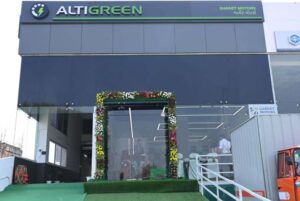Altigreen has organized a webinar titled, ‘Ecosystem for Electrification in Last Mile Mobility,’ on the occasion of World EV Day, on 26th September 2023.
 The hour-long webinar saw topics relevant to the electric mobility space and reflected Altigreen’s strong commitment to fostering sustainable and carbon-free transportation solutions.
The hour-long webinar saw topics relevant to the electric mobility space and reflected Altigreen’s strong commitment to fostering sustainable and carbon-free transportation solutions.
The webinar saw participation from eminent industry stakeholders such as Abhishek Dabas, CEO, Gentari Mobility; Visakh Sashikumar, Founder & CEO, Fyn Mobility; Pinkal Joshi, Head Infra, Tata Power; Balamurgan T, Director Sales, Sriram Finance; Dimpy Suneja, Consultant, EV Policy, Rocky Mountain Institute; and Amitabh Saran, Founder and CEO, Altigreen.
Amitabh Saran opened the discussion with alarming statistics. Saran said, “As many as 2.6 million people lose their lives every year in India because of poor air quality. And 25% of that is attributed to transport. When around 1 lakh people died due to Covid-19 pandemic, there was a national lockdown, and here we’re talking about 5-6 lakh people dying due to air pollution caused by transport, every year, and this will continue if something is not done immediately. We, at Altigreen, decided to focus on electrifying three-wheelers because the numbers are really big and we wanted to make a change at the bottom end of the pyramid. This, despite the fact that we had built technology for two, three and four wheelers, and farm equipment.” EVs open up an entire array of partnerships that we need to have. This is a growing, fast-moving and disruptive industry; and when disruptions happen, you need an ecosystem of partners to make this revolution a success.”
The panel addressed key points such as ‘Fame 2 Policy how it helps for electrification and whether should it be continued for future’, ‘Charging infra: will it be a bottleneck for electrification?’, ‘Financing and Leasing as enabler for electrification for Last Mile mobility’, ‘Will 3W Cargo electric continue to play a major role in organised Last Mile sector dominated by 4W Cargos’, and more.
While talking about charging infrastructure for last mile connectivity, Abhishek Dabas, CEO, Gentari Mobility, said, “Commercially, charging plays a big role. We have big hubs that we offer our customers to park and charge, and at times, they have their own place where they prefer to do the charging. Today, it is 70:30 where most of the people prefer to charge their vehicles at their own place, with 30% people requiring fast-charging. We are closely monitoring this space to see how it evolves.”
Speaking about the role of finance companies in the electric mobility space in India, Balamurgan T, Director Sales, Sriram Finance, said, “For us, the small ticket-sized funding is a very specialized business. We have a lot of risk-taking partners – small financers who have partnered with us and are experts in dealing with small ticket size. When you lend to customers with daily earning business, the crucial part is how do we counsel, what is the kind of EMI that he/she can pay and how can he cover his backup.” He further added, “In the case of commercial three-wheelers, the initial negative approach with regards to the lead batteries and other factors, the financers took a step back; they are waiting. However, I am confident that going forward, we have nothing to wait but to get on and follow the market leaders.”
While addressing the issue of less than desirable charging infrastructure in the country, Pinkal Joshi, Head Infra, Tata Power, said, “At Tata Power, we are expanding our charging infrastructure across the country; we have installed over 4300 charging points. We see a larger opportunity in terms of a captive charging hub solution in the last-mile segment, especially for players who give their fleets on contract, where around 30-50 vehicles can be charged at a time. We are keen to tie-up with such companies.”
While answering the question of whether it is feasible to continue giving subsidies for adoption of EVs, Dimpy Suneja, Consultant, EV Policy, Rocky Mountain Institute, said, “With leasing and financing businesses growing at the scale they are, and with a diverse charging need of users, it is important that the policy acts as a facilitator rather than a deterrent for EV adoption. This process needs to be a continuous consultative process. There has to be dedicated funding, along with timely monitoring and evaluation of the policy which would achieve the aim of the policy.”
The webinar concluded with the panelists inviting questions from the audience and taking turns to answer them. One of the audience members asked, “Is DC operators’ adoption of EVs higher than the aggregators or vice versa? While answering the question, Visakh Sashikumar, Founder & CEO, Fyn Mobility, said, “Almost every investor asks us this question. Right now, buying of vehicles from DCOs is lower as compared to the on take that we do as a fleet operator. We buy vehicles in bulk from the OEMs whereas DCOs are on the sidelines. But it will come up, and once it does, it will become easier for us because for us, it is better if the driver takes the liability, whereas most financers would like it to be the other way round. It’s a chicken and egg problem, but we feel that for us, its not about the liability. It is about control on the vehicle and the overall operations so that we can utilise the vehicle more.”
